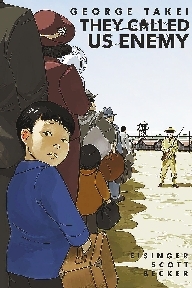
《我们是日本敌人》 This black-and-white graphic novel tells the story of how George Takei, known for playing Hikaru Sulu on “Star Trek: The Original Series,” was imprisoned in an internment camp* during World II, how his family survived those four years, and how they moved forward once the war ended. On December 7, 1941, the Japanese attacked Pearl Harbor. Not long after, 120,000 people of Japanese ancestry living in the United States were sent to live in internment camps. In 1942, Takei was incarcerated* first at Santa Anita Racetrack, where the family spent months living in a horse stall, and then in two other internment camps. He had just turned 5. He spent the next four years living behind barbed wire with his parents and two younger siblings. Especially harrowing* was the long train trip from California to their first internment camp in Arkansas, taken at a time in history when being herded onto a train led to a notoriously bad outcome. Takei’s mother did everything she could to turn the journey into a vacation for her children. She was born in the United States, but his father had been born in Japan. He was not a U.S. citizen because at the time it was illegal for Asians to apply for U.S. citizenship. While the Takei family was in an internment camp, the Supreme Court found the camps unconstitutional. U.S. citizens could no longer be held in internment camps, but ironically Japanese-Americans were safer behind barbed wire because of the racist environment of the time. Takei’s mother took the difficult step of renouncing her U.S. citizenship so she could remain in the camp, only to face deportation to war-ravaged Japan when the war ended. (SD-Agencies) | 
